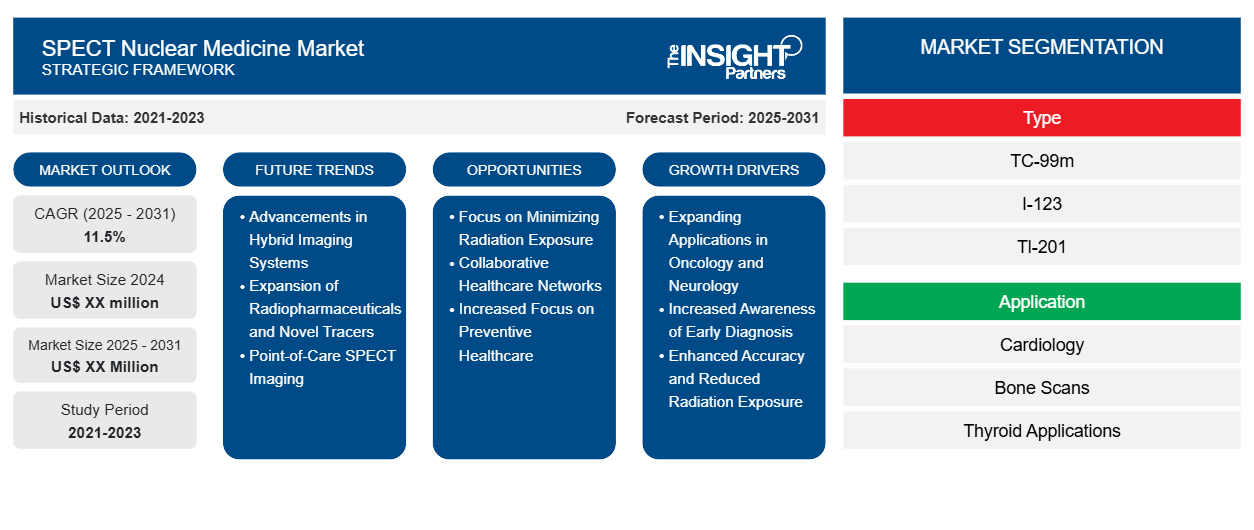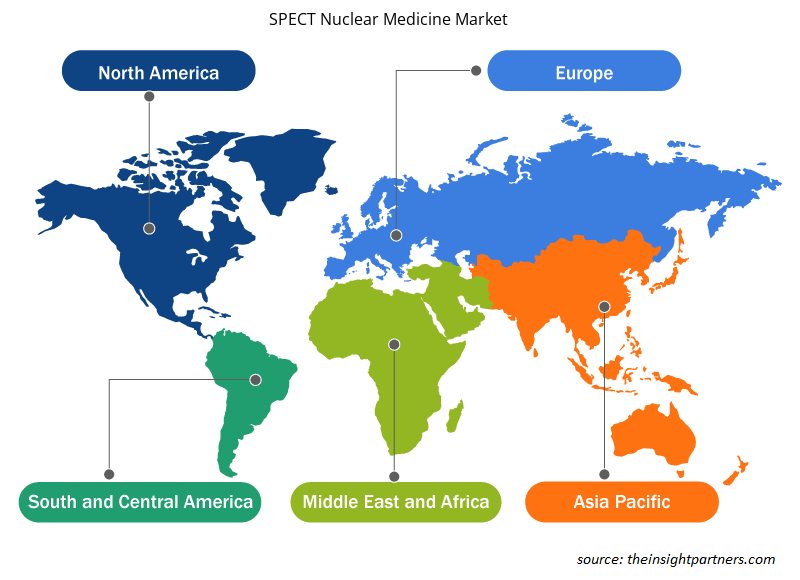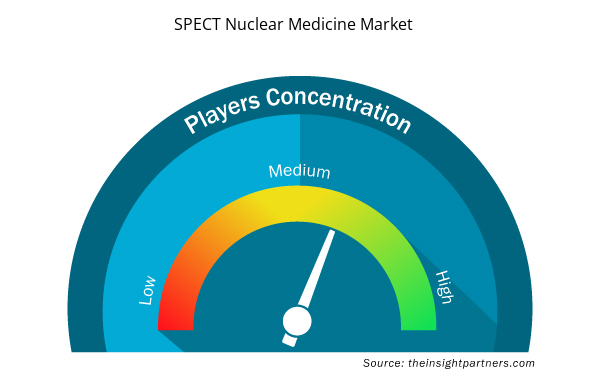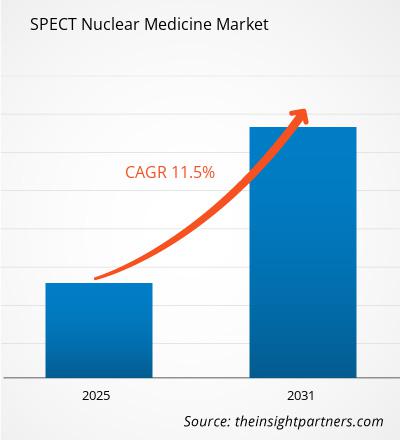The SPECT Nuclear Medicine Market is expected to register a CAGR of 11.5% from 2025 to 2031, with a market size expanding from US$ XX million in 2024 to US$ XX Million by 2031.
The SPECT Nuclear Medicine Market report covers segmental analysis by Type (TC-99m, I-123, Tl-201, GA-67, Other SPECT Isotopes); Application (Cardiology, Bone Scans, Thyroid Applications, Pulmonary Scans, Other SPECT Applications) and Geography (North America, Europe, Asia Pacific, and South and Central America). The global analysis is further broken down at the regional level and major countries. The report Offers the Value in US$ for the above analysis and segments.
Purpose of the Report
The report SPECT Nuclear Medicine Market by The Insight Partners aims to describe the present landscape and future growth, top driving factors, challenges, and opportunities. This will provide insights to various business stakeholders, such as:
- Technology Providers/Manufacturers: To understand the evolving market dynamics and know the potential growth opportunities, enabling them to make informed strategic decisions.
- Investors: To conduct a comprehensive trend analysis regarding the market growth rate, market financial projections, and opportunities that exist across the value chain.
- Regulatory bodies: To regulate policies and police activities in the market with the aim of minimizing abuse, preserving investor trust and confidence, and upholding the integrity and stability of the market.
SPECT Nuclear Medicine Market Segmentation
Type
- TC-99m
- I-123
- Tl-201
- GA-67
- Other SPECT Isotopes
Application
- Cardiology
- Bone Scans
- Thyroid Applications
- Pulmonary Scans
- Other SPECT Applications
Customize This Report To Suit Your Requirement
You will get customization on any report - free of charge - including parts of this report, or country-level analysis, Excel Data pack, as well as avail great offers and discounts for start-ups & universities
SPECT Nuclear Medicine Market: Strategic Insights

- Get Top Key Market Trends of this report.This FREE sample will include data analysis, ranging from market trends to estimates and forecasts.
SPECT Nuclear Medicine Market Growth Drivers
- Expanding Applications in Oncology and Neurology: SPECT Nuclear Medicine is becoming increasingly important in oncology and neurology. In oncology, it helps in detecting and staging various cancers, guiding treatment plans, and monitoring therapeutic responses. Similarly, in neurology, SPECT imaging is crucial for diagnosing conditions such as Alzheimer’s disease, Parkinson’s disease, and epilepsy. As research continues to uncover new applications and therapeutic uses for SPECT in these fields, the market is expected to witness sustained growth, driven by its critical role in precision diagnostics.
- Increased Awareness of Early Diagnosis: There is a growing global awareness about the importance of early disease detection for improved treatment outcomes. As patients and healthcare providers prioritize early diagnosis, the demand for advanced imaging techniques like SPECT Nuclear Medicine continues to grow. Public health campaigns and educational initiatives on the value of early detection are encouraging more patients to seek nuclear medicine-based diagnostic procedures, thus propelling market growth.
- Enhanced Accuracy and Reduced Radiation Exposure: With a strong focus on patient safety, modern SPECT Nuclear Medicine technologies have improved accuracy while minimizing radiation exposure. Innovations such as low-dose imaging protocols are addressing concerns over radiation safety, making SPECT imaging a more attractive option for both healthcare providers and patients. This enhanced safety profile is increasing the adoption of SPECT in clinical settings, further driving market expansion.
SPECT Nuclear Medicine Market Future Trends
- Advancements in Hybrid Imaging Systems: Hybrid imaging systems, particularly SPECT/CT and SPECT/MRI, are gaining traction in the SPECT Nuclear Medicine market. These combined technologies offer superior anatomical and functional imaging, allowing for more accurate diagnoses, better treatment planning, and monitoring. In the future, hybrid systems are expected to become more sophisticated, offering higher resolution images, real-time imaging capabilities, and even greater integration of molecular and physiological data. This advancement will provide clinicians with a more comprehensive view of a patient's condition, further expanding the potential applications of SPECT Nuclear Medicine.
- Expansion of Radiopharmaceuticals and Novel Tracers: The development of new radiopharmaceuticals and imaging agents is poised to be a key trend in the SPECT Nuclear Medicine market. Novel tracers designed for specific disease markers are enhancing the ability to detect a wider range of conditions with greater sensitivity. As research continues into radiotracers for oncological, cardiovascular, and neurodegenerative disorders, the SPECT Nuclear Medicine market will see an increase in the number of clinical applications and therapeutic options. The ability to target specific biomarkers through customized radiopharmaceuticals will play a major role in revolutionizing disease diagnosis and monitoring in the future.
- Point-of-Care SPECT Imaging: The future of SPECT Nuclear Medicine may also include the rise of point-of-care (POC) imaging systems. These compact, portable devices could bring SPECT imaging to smaller, more accessible healthcare settings like ambulatory clinics, emergency departments, and even remote or underserved areas. POC SPECT systems would provide immediate diagnostic results, reducing patient wait times and facilitating timely treatment decisions. The growing demand for convenient and efficient healthcare services will drive the development of portable SPECT Nuclear Medicine technologies, making them more widespread and accessible to diverse patient populations.
SPECT Nuclear Medicine Market Opportunities
- Focus on Minimizing Radiation Exposure: As patient safety continues to be a priority in medical imaging, the SPECT Nuclear Medicine market will see innovations designed to reduce radiation exposure. New technologies are being developed that allow for lower doses of radiopharmaceuticals while maintaining diagnostic image quality. Furthermore, advancements in detector sensitivity and image reconstruction techniques are expected to enable more precise imaging with reduced radiation levels. This trend toward minimizing radiation exposure will help alleviate concerns over safety, leading to broader acceptance and adoption of SPECT imaging procedures.
- Collaborative Healthcare Networks: The future of SPECT Nuclear Medicine will likely involve greater integration within collaborative healthcare networks, where imaging data can be shared across different healthcare systems in real-time. Cloud-based platforms, combined with SPECT imaging, will allow for enhanced collaboration between radiologists, oncologists, neurologists, and other specialists. This networked approach will improve the speed and accuracy of diagnoses, treatment planning, and patient management. The trend toward interconnected healthcare solutions is set to boost the utilization of SPECT Nuclear Medicine by enabling multi-disciplinary teams to work more efficiently and effectively.
- Increased Focus on Preventive Healthcare: The shift toward preventive healthcare will also impact the SPECT Nuclear Medicine market. As more healthcare systems focus on early detection and prevention, SPECT imaging will become a valuable tool for monitoring patients at risk of developing serious conditions, even before symptoms manifest. For example, SPECT can help detect early stages of cardiovascular disease, neurological disorders, and certain types of cancer, allowing for intervention before more severe symptoms arise. As preventive healthcare continues to grow, SPECT Nuclear Medicine will become an integral part of routine check-ups and health monitoring, particularly in high-risk patient populations.
SPECT Nuclear Medicine Market Regional Insights
The regional trends and factors influencing the SPECT Nuclear Medicine Market throughout the forecast period have been thoroughly explained by the analysts at Insight Partners. This section also discusses SPECT Nuclear Medicine Market segments and geography across North America, Europe, Asia Pacific, Middle East and Africa, and South and Central America.

- Get the Regional Specific Data for SPECT Nuclear Medicine Market
SPECT Nuclear Medicine Market Report Scope
| Report Attribute | Details |
|---|---|
| Market size in 2024 | US$ XX million |
| Market Size by 2031 | US$ XX Million |
| Global CAGR (2025 - 2031) | 11.5% |
| Historical Data | 2021-2023 |
| Forecast period | 2025-2031 |
| Segments Covered |
By Type
|
| Regions and Countries Covered | North America
|
| Market leaders and key company profiles |
SPECT Nuclear Medicine Market Players Density: Understanding Its Impact on Business Dynamics
The SPECT Nuclear Medicine Market market is growing rapidly, driven by increasing end-user demand due to factors such as evolving consumer preferences, technological advancements, and greater awareness of the product's benefits. As demand rises, businesses are expanding their offerings, innovating to meet consumer needs, and capitalizing on emerging trends, which further fuels market growth.
Market players density refers to the distribution of firms or companies operating within a particular market or industry. It indicates how many competitors (market players) are present in a given market space relative to its size or total market value.
Major Companies operating in the SPECT Nuclear Medicine Market are:
- Cardinal Health
- Curium
- GE Healthcare
- Lantheus Medical Imaging, Inc.
- Bayer AG
- Bracco Imaging S.P.A.
Disclaimer: The companies listed above are not ranked in any particular order.

- Get the SPECT Nuclear Medicine Market top key players overview
Key Selling Points
- Comprehensive Coverage: The report comprehensively covers the analysis of products, services, types, and end users of the SPECT Nuclear Medicine Market, providing a holistic landscape.
- Expert Analysis: The report is compiled based on the in-depth understanding of industry experts and analysts.
- Up-to-date Information: The report assures business relevance due to its coverage of recent information and data trends.
- Customization Options: This report can be customized to cater to specific client requirements and suit the business strategies aptly.
The research report on the SPECT Nuclear Medicine Market can, therefore, help spearhead the trail of decoding and understanding the industry scenario and growth prospects. Although there can be a few valid concerns, the overall benefits of this report tend to outweigh the disadvantages.
- Historical Analysis (2 Years), Base Year, Forecast (7 Years) with CAGR
- PEST and SWOT Analysis
- Market Size Value / Volume - Global, Regional, Country
- Industry and Competitive Landscape
- Excel Dataset


- Rare Neurological Disease Treatment Market
- Portable Power Station Market
- Animal Genetics Market
- Mesotherapy Market
- Bio-Based Ethylene Market
- Medical and Research Grade Collagen Market
- Vessel Monitoring System Market
- Hydrogen Storage Alloys Market
- Retinal Imaging Devices Market
- Machine Condition Monitoring Market

Report Coverage
Revenue forecast, Company Analysis, Industry landscape, Growth factors, and Trends

Segment Covered
This text is related
to segments covered.

Regional Scope
North America, Europe, Asia Pacific, Middle East & Africa, South & Central America

Country Scope
This text is related
to country scope.
Frequently Asked Questions
The SPECT Nuclear Medicine Market is expected to register a CAGR of 11.5% from 2025-2031.
The major factors impacting the SPECT Nuclear Medicine Market are: Expanding Applications in Oncology and Neurology, Increased Awareness of Early Diagnosis and Enhanced Accuracy and Reduced Radiation Exposure
Key future trends in this market are - Advancements in Hybrid Imaging Systems, Expansion of Radiopharmaceuticals and Novel Tracers and Point-of-Care SPECT Imaging
Key companies of this market are: Cardinal Health, Curium, GE Healthcare, Lantheus Medical Imaging, Inc., Bayer AG, Bracco Imaging S.P.A., Eczacibasi-Monrol Nuclear Products, Nordion, Inc. (A Subsidiary of Sterigenics International), Advanced Accelerator Applications (AAA) (A Part of Novartis), NTP Radioisotopes Soc, LTD.
The report can be delivered in PDF/PPT format; we can also share excel dataset based on the request.
Some of the customization options available based on request are additional 3–5 company profiles and country-specific analysis of 3–5 countries of your choice. Customizations are to be requested/discussed before making final order confirmation, as our team would review the same and check the feasibility.
Trends and growth analysis reports related to Life Sciences : READ MORE..
1. Cardinal Health
2. Curium
3. GE Healthcare
4. Lantheus Medical Imaging, Inc.
5. Bayer AG
6. Bracco Imaging S.P.A.
7. Eczacibasi-Monrol Nuclear Products
8. Nordion, Inc. (A Subsidiary of Sterigenics International)
9. Advanced Accelerator Applications (AAA) (A Part of Novartis)
10. NTP Radioisotopes Soc, LTD.

 Get Free Sample For
Get Free Sample For